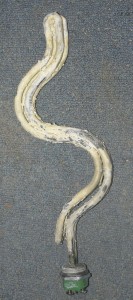Hardness Scale: Enemy of Plumbing Systems, Appliances, and Domestic Tranquility
Water Treatment 101: Scale
Scale is a serious problem caused by the deposit of hardness minerals (mainly calcium and magnesium). Hardness can block piping systems, causing the loss of water pressure due to reduced pipe diameter, and it can greatly reduce the effectiveness of home heating systems and hot water heaters. Scaled pipes and appliances waste energy and money.
Scaling is caused by hardness of water. Hardness is defined, in simple terms, as the amount of calcium and magnesium present in the water. Hardness is measured either in parts per million or as grains per gallon. Water treatment professionals most often use grains per gallon. The conversion is easy: a “grain” is equal to about 17.1 parts per million.
Although there is no absolute standard, water is usually considered hard enough to cause problems at about 4 grains per gallon, and it is considered hard enough to require treatment at 7 grains per gallon and up. There is no upper limit on hardness, but water of 100 grains per gallon is rare.
The standard residential treatment for hard water is the conventional water softener, which exchanges sodium ions for the hard water minerals, calcium and magnesium. Conventional softeners are proven, reliable tools. They use salt in the softening process. In recent years a number of electronic and non-electronic softener substitutes have come on the market. Some of these are more effective than others. Template Assisted Crystallization (called TAC) is now the most widely used of the alternative scale preventives. TAC units not only prevent scale buildup but they remove existing scale as well.

Badly scaled water heater element after only 40 days service on 26 grain hard well water. (Click picture for larger image.)
More information:




